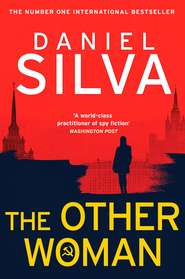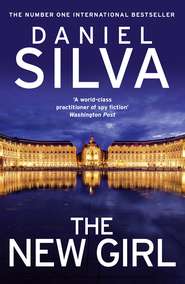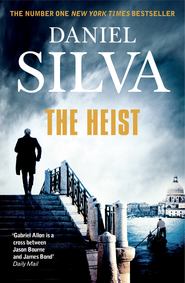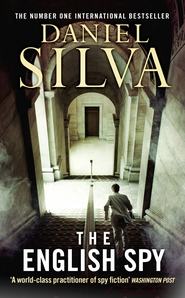По всем вопросам обращайтесь на: info@litportal.ru
(©) 2003-2024.
✖
The Fallen Angel
Настройки чтения
Размер шрифта
Высота строк
Поля
“A collection of the Holy Father’s encyclicals?”
Father Mark frowned. He didn’t like jokes about His Holiness. He didn’t like Gabriel much, either.
“It’s all of Dr. Andreatti’s research into the entire antiquities collection, just as you requested.”
“All in this little bag? How miraculous.”
“Thumb drives,” the priest explained pedantically. Father Mark might have had a sense of humor once, but it had been scrubbed away by eight years of seminary training.
“What about her phone records?”
“I’m working on it.”
“E-mail?”
“This is the Vatican we’re talking about. These things take time.” Nothing registered on the young priest’s angelic face. Even Gabriel couldn’t tell whether he was holding a straight flush or a pair of deuces. “The monsignor would like to know how you intend to proceed with your inquiry,” he said, checking his BlackBerry.
“The first thing I’m going to do is go blind reading several thousand pages of documentation regarding the provenance of your antiquities collection.”
“And then?”
“Tell the monsignor he’ll be the first to know.”
The priest stood abruptly and, citing an urgent matter requiring his attention, headed back to the Vatican. Gabriel slipped the plastic bag into his coat pocket, hesitated for a moment, and then auto-dialed a number on his BlackBerry. A gruff male voice answered in Hebrew. Gabriel murmured a few words in the same language and quickly severed the connection before the man at the other end could object. Then he sat there as night fell over the narrow street, wondering whether he had just made his first mistake.
There were few more thankless jobs than to be the declared chief of an Office station in Western Europe. Shimon Pazner, head of the generously staffed post inside the Israeli Embassy in Rome, had borne that burden longer than most. His tenure had coincided with a precipitous slide in Israel’s public standing among Europeans of every stripe. Where once his country was regarded as a minor irritant, Europeans now viewed the Zionist enterprise with almost universal contempt and scorn. Israel was no longer a beacon of democracy in a troubled Middle East; it was an illegitimate rogue, an occupier, and a threat to world peace. Famously undiplomatic, Pazner had done little to help his cause. High on the list of Italian grievances was his conduct during meetings. His standard response when questioned about Israeli tactics and operations was to remind his brethren that, were it not for the deplorable conduct of Europeans, there would be no Israel at all.
Gabriel found Pazner seated alone on a stone bench outside the Galleria Borghese. Short and compact, he had gunmetal gray hair and a face like pumice. He offered Gabriel a perfunctory greeting in Italian, then suggested it might be better if they walked. They headed westward across the gardens along a footpath lined with umbrella pine. The cold air was heavy with the scent of damp leaves, wood smoke, and cooking—the smell of Rome on a winter’s night. Pazner spoiled it by lighting a cigarette. His mood seemed worse than usual, but it was always a little hard to tell with Pazner. Rome annoyed him. As far as Pazner was concerned, it would always be the center of the empire that had destroyed the Second Temple and scattered the Jews to the four winds of the diaspora. He was a man with a long memory who held grudges. Gabriel was the object of several.
“I suppose it’s fortuitous you called,” he said finally. “We needed to have a word with you.”
“We?”
“Don’t get nervous, Gabriel. No one at King Saul Boulevard has any intention of calling you out of retirement again, not after what you went through in Saudi Arabia. Even the old man seems content to leave you in peace this time.”
“Are you sure we’re talking about the same Ari Shamron?”
“Actually, he’s not the same, not anymore.” Pazner was silent for a moment. “Far be it from me to tell you how to live your life,” he said at last, “but it might be a good idea to pay him a visit the next time you’re in town.”
“When did you see him last?”
“A few weeks ago when I was in Tel Aviv for the annual meeting of the station chiefs. Shamron made his traditional appearance at dinner on the last night. He used to stay up to all hours regaling us with stories about the old days, but this time I had the sense he was just going through the motions. All I could think about was how things were when we were kids. Do you remember what he was like back then, Gabriel? The ground seemed to tremble whenever the old man entered a room.”
“I remember,” said Gabriel distantly, and for a moment he was striding across the courtyard of the Bezalel Academy of Art and Design in Jerusalem, on a sun-bleached afternoon in September 1972. Seemingly from nowhere there appeared a small iron bar of a man with hideous black spectacles and teeth like a steel trap. The man didn’t offer a name, for none was necessary. He was the one they spoke of only in whispers. The one who had stolen the secrets that led to Israel’s lightning victory in the Six-Day War. The one who had plucked Adolf Eichmann, managing director of the Holocaust, from an Argentine street corner.
As usual, Shamron had come well prepared that day. He had known, for example, that Gabriel descended from a long line of gifted artists, that he spoke fluent German with a pronounced Berlin accent, and that he was married to a fellow art student named Leah Savir. He had also known that Gabriel, having been raised by a woman who had survived the Nazi death camp at Birkenau, was a natural keeper of secrets. “The operation will be called Wrath of God,” he had said that day. “It’s not about justice. It’s about vengeance, pure and simple—vengeance for the eleven innocent lives lost at Munich.” Gabriel had told Shamron to find someone else. “I don’t want someone else,” Shamron had said. “I want you.”
It was but one of many arguments Shamron would eventually win. Time and time again, he had managed to manipulate Gabriel into doing his bidding, always coming up with some excuse, some minor operational errand, to keep his gifted prodigy within reach of the Office. It had been Shamron’s wish that Gabriel assume his rightful place in the director’s suite at King Saul Boulevard. But Gabriel, in one final act of defiance, had turned his back on the offer, handing the job instead to an old rival named Uzi Navot. For a time, it seemed Navot would be willing to act merely as Shamron’s puppet. But now, having established his hold over the Office, Navot had banished Shamron to the Judean Wilderness, thus severing the old man’s ties to the intelligence service he had created in his own image. Shamron lived now in something akin to internal exile at his villa overlooking the Sea of Galilee. The politicians and generals who used to seek his advice no longer beat a path to his door. To fill the empty hours, he repaired antique radios and tried to concoct some way to convince Gabriel, whom he loved as a son, to come home again.
“How often does he call to check up on me?”
“Never,” replied Pazner, shaking his head for emphasis.
“How often, Shimon?”
“Twice a week, sometimes three. In fact, I just got off the phone with him before you called.”
“What did he want?”
“King Saul Boulevard is in an uproar. They’re convinced something is about to come down. Something big.”
“Is there anything specific on the target?”
Pazner took a final pull at his cigarette and sent the ember arcing into the darkness. “It might be an embassy or a consulate. It might be a synagogue or a community center. They think it’s going to happen in the south, probably Istanbul or Athens, but they can’t rule out Rome. We’ve barely finished rebuilding from the last time we were hit.” Pazner glanced at Gabriel and added, “Something tells me you remember that attack well.”
Gabriel didn’t respond directly. “Is it al-Qaeda?”
“After your last operation, there’s probably no al-Qaeda network or cell capable of carrying out a major attack in Europe. And since the Palestinians have no interest in hitting us here at the moment, that leaves only one other candidate.”
“The Iranians.”
“Acting through their favorite proxy, of course.”
Hezbollah …
They had reached the edge of the Piazza di Siena. The broad dusty oval was awash with pale moonlight, and the sound of the traffic along the Corso was but a whisper. It was almost possible to imagine they were the last two men alive in an ancient city.
“What’s the source?” asked Gabriel.
“Sources,” countered Pazner. “It’s a mosaic of intelligence, both human and signals. It appears the Qods Force of the Revolutionary Guard is running the operation. Department Five of VEVAK is apparently involved as well.”
VEVAK was the Persian-language acronym of the Ministry of Intelligence and National Security, Iran’s formidable intelligence service. Department Five was among its most important divisions, for it dealt exclusively with the State of Israel.
“According to one of our assets in southern Lebanon,” Pazner continued, “a team of Hezbollah operatives left Beirut about six weeks ago. We think it’s a straight revenge operation. Frankly, we’ve been expecting something like this for some time. They have good reason to be angry at us.”
For much of the past decade, the Office had been waging a not-so-secret war against the Iranian nuclear weapons program. Scientists had been assassinated, destructive computer viruses had been introduced into labs and facilities, and faulty parts had been cleverly inserted into Iran’s nuclear supply chain—including several dozen sabotaged industrial centrifuges that destroyed four secret enrichment facilities. The operation had been one of Gabriel’s finest. Fittingly, it had been code-named Masterpiece.
“Has my name come up in any of the intel?”
“Not a whisper. But that doesn’t mean they don’t suspect you were the one behind it. Anyone who underestimates the Iranians does so at his own risk, you included.”
“I’ve never underestimated them. But I have no intention of spending the rest of my life in hiding.”
“No one’s suggesting that.”
“What are you suggesting?”
“Jerusalem is lovely this time of year.”











